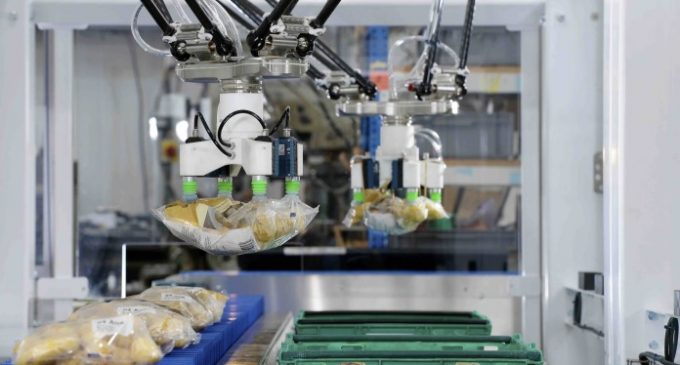Smarter Factories – Safer Working

In food produce environments and packhouses, the benefits of automation when it comes to workforce health and safety are uncontended. From eliminating arduous and repetitive tasks to working uninterrupted within inhospitable chilled settings, robots are most certainly the future. Case loading specialist Brillopak and industrial automation pioneer Omron explore how smart robots, hardware and software can be deployed to work collaboratively, safely and productively alongside human counterparts.
The picture frequently painted with Industry 4.0 is a “lights out factory” – a completely automated smart factory, requiring no human intervention. Yet, that’s not so much a journey forward as a complete step change, and for many it doesn’t represent a practical implementation of Industry 4.0 at all. Operators and maintenance staff are going to be key elements of any Industry 4.0 smart factory installation well into the future, and that in turn means that safety continues to be a vital consideration.
For packing operations commencing their Industry 4.0 journey, the issue is not so much one of removing people from the plant floor as implementing systems where people work in harmony and safely with the processes.
Brillopak director David Jahn explains: “Health & Safety should never be an afterthought. In order to work safer and achieve greater productivity, it is critical that factories take a strategic view of the legal and operational requirements at the outset. Automated packing, case loading and palletising machines should always be designed around safety rather than designed for a function and then bolting on a safety system later on in the manufacturing or testing process. This isn’t radically new or specifically applicable to Industry 4:0 – just good, safe, productive business practice. However, it requires a different mindset to machine building.”
The daily quest to optimise productivity and meet tight deadlines means that operators and maintenance personnel are almost forced to try to defeat safety systems. When the default reaction of a machine is an emergency stop triggered whenever an operator approaches, productivity can never be optimised. Indeed, such safety arrangements may almost be considered as confrontational from an operator’s point of view.
Putting into context a typical packing scenario, David says many ‘stop-start’ activities can treble production downtime and eat into OEE. If the restart process from a controlled or emergency stop is not logical, simple and fast, this too encourages reckless behaviour among machine operatives, who typically bypass safety measures to get a machine up and running again.
“Short line stops are often viewed as the bane of packing line operations,” notes David.
To overcome situations like this, Brillopak’s P160 robotic case packer applies a combination of technology, variable speed drives and mechanics that make restarts less complex. As a result, personnel are less inclined to take short cuts.
Suggesting that safety systems in the future could be all but invisible to operators and maintenance personnel, Dan Rossek from Omron concurs saying: “People in the future will have no reason to try to defeat the safety technologies because they are no longer slowing them down.”
Don’t let your safety guard down.

































